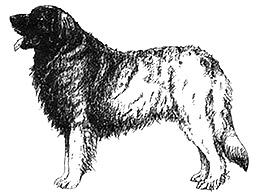Breed standards
Leonberger
Breed standards are the official guidelines that describe the ideal characteristics, temperament, and appearance of a breed and ensures that the breed is fit for function with soundness essential.

Kennel Club, London 1994
Large, strong, muscular yet elegant. Confident, calm and lively. Males in particular should be powerful and strong.
Amenable, intelligent and fearless companion; distinguished by his friendliness.
Self-assured and playful. Neither timid nor aggressive.
Head in balance with body and limbs. Strong, but not heavy, elongated rather than stocky. Proportions of muzzle to skull equal. No wrinkles. Skull in profile and seen from the front slightly arched. The back part of the skull not substantially broader than at the eyes. Medium stop. Nose black. Cheeks only moderately developed, muzzle moderately tapered, but never snipey. Nasal bridge of even breadth and slightly arched (roman nose).
Neither deep set nor protruding, of medium size. Oval in shape with kind expression. Medium to dark brown in colour. Eyelids close fitting, showing no haw.
Set on high and not too far back pendant medium sized, hanging close to the side of the head, fleshy with rounded tips, well feathered.
Strong jaws with perfect regular and complete scissor bite, level bite tolerated. Teeth evenly placed and vertical in the jaw, with complete dentition. No constriction of the canines in the lower jaw. Lips close fitting, black, corner of lips closed.
Strong, flowing into the withers in a slight arch, without throatiness. Moderately long, no dewlap.
Shoulders well laid, elbows close fitting. Forelegs straight, well boned and not too close. Shoulder and upper arm long, sloping and well muscled. Pasterns strong, firm and straight when seen from front, almost vertical seen from side.
Height at withers to length of body in ratio of 9 to 10 (measured from point of shoulder to point of buttock). Depth of chest approximately 50% of height at withers, which should be pronounced, especially in males. Moderate forechest. Chest broad, deep, reaching at least to elbows. Oval, not barrel-chested. Back firm and straight with broad loins, strong and well muscled. Moderately sloping croup with relatively long broad rump, gently rounded. Rump never higher than withers. Slight tuck up.
Legs set not too close together and parallel when seen from rear. Well muscled long, slanting upper thigh. Moderate bend of stifle. Hocks strong, angle between lower thigh and rear pastern well defined, turned neither in not out.
Tight and rounded with well arched toes. Front feet pointing directly forwards. Pads black.
Well furnished, straight, reaching at least to hock. On the move tail slightly curved, not carried above level of back. Never forming a ring.
Ground covering, even movement in all gaits maintaining a level topline. Extending well in front with good drive from hindquarters. Seen from front and behind, legs move in a straight line when walking or trotting.
Double coated, medium soft to harsh, fairly long, close fitting. Never with a parting and not obscuring the outline despite the thick undercoat. Straight or slight wave permitted. Mane on neck and chest, especially in the males. Distinct feathering on front legs and ample breeches on hindlegs.
Lion gold, red, reddish brown, sandy (fawn or cream) and all combinations in between, always with a black mask. Black hair tips are permitted. Black must not dominate basic colour. Lighter colour on underside of tail, mane, feathering on front legs and breeches on hindlegs normal, but must not be pronounced. A small white patch or stripe on the chest and white hair on the toes tolerated.
Height at Withers
Dogs: 72-80 cms (28.5-31.5 ins)
Bitches: 65-75 cms (25.5-29.5 ins)
Any departure from the foregoing points should be considered a fault and the seriousness with which the fault should be regarded should be in exact proportion to its degree and its effect upon the health and welfare of the dog.
Male animals should have two apparently normal testicles fully descended into the scrotum.

